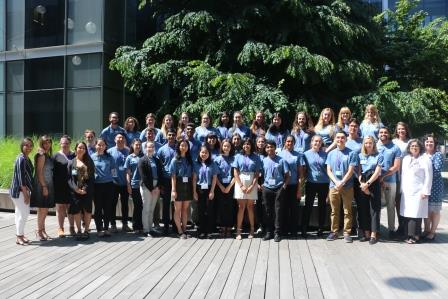
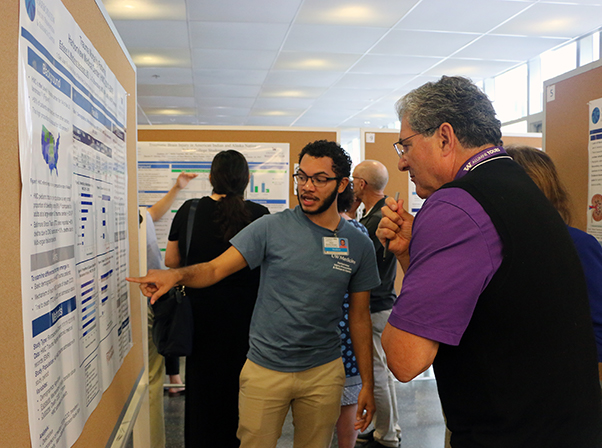
Harborview Injury Prevention & Research Center’s 2019 INSIGHT Symposium highlights intern research projects focused on building skills and experience studying injury, with this year’s topics focusing on opioid use, suicide prevention, medical education, burn patient experiences, traumatic brain injury, and much more.
The primary goal of the INSIGHT Research Program is to develop the next generation of injury researchers, though not every path to academic medicine looks the same, said keynote speaker Molly Fuentes, M.D., MPH, assistant professor of rehabilitation medicine at the University of Washington and Seattle Children’s Hospital. Fuentes shared how childhood and family experiences shaped her choices about her medical career and mission.
Fuentes is a registered member of the Confederated Tribes of Warm Springs in Oregon, where she grew up with the unwavering goal of becoming a doctor.
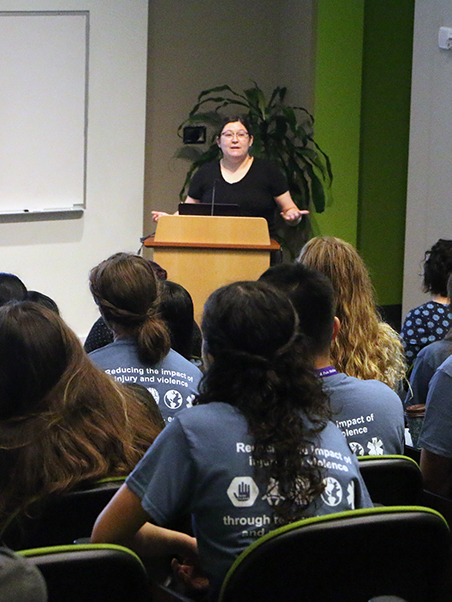
“I was so lucky to never have anybody in my life who said, ‘That’s never going to happen,’” she said.
Through the medical experiences of her family, Fuentes was exposed to many medical fields, eventually choosing to pursue rehabilitation medicine. From there, she found her mission.
“I noticed Native Americans and Alaska Natives were uncomfortable in rehabilitation facilities,” she said. By digging deeper, Fuentes found that recommendations for rehabilitation weren’t taking into account patient needs from a cultural perspective. In a number of examples, patients wanted to participate in traditional community activities, and could have – if their health providers had learned about this need and provided the right tools and support.
“Rehabilitation didn’t consider this value,” she said. “My goal is incorporating culture into rehabilitation services.”
While the INSIGHT interns’ career paths probably won’t look like hers, Fuentes said, she encouraged them to seek their path and find their mission.
Following the keynote, INSIGHT held a competitive poster symposium. In a program first, feedback from the poster judges led to ties between multiple winning projects.
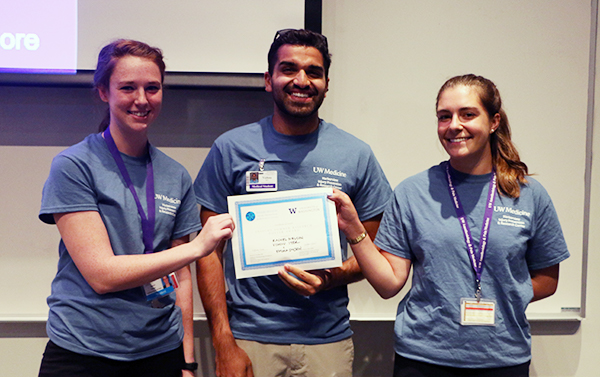
The recognized projects include “Floor vs. ICU Management of Isolated Low Grade Renal Trauma: A Retrospective Cohort Study,” by Vishnu Iyer of the University of Washington School of Medicine, mentored by HIPRC associate member Judith Hagedorn, M.D., MHS; “Distinguishing Characteristics of State Policies Related to Training School Personnel in Suicide Prevention and Awareness,: by Rachel Nelson of Washington State University, mentored by Janessa Graves, Ph.D., MPH, and core member Megan Moore, Ph.D., MSW; “Burn Patients’ Pain Experiences and Perceptions,” by Emma Duchin of Scripps College, mentored by HIPRC associate member Tam Pham, M.D.; “Firearm Deaths in King County, Washington: 2011-2018,” by Hanne Boveng of Cornell University, mentored by core member Fred Rivara, M.D., MPH, and “Outcomes for Anterior and Posterior Open Globe Injuries” by Audrey Rustad of West Virginia University, mentored by associate member Yewlin Chee, M.D.
The program also highlighted the high school program’s capstone project, which focused on adapting Stop the Bleed emergency response training for high school students and was supported in part by PEMCO Insurance. For their project, the high school students conducted surveys and focus groups, analyzed their findings, drafted formal recommendations, and developed an evaluation plan, with the ultimate goal of sharing their findings with local and national leaders on the Stop the Bleed initiative and encouraging their own school administrators to host a Stop the Bleed training.
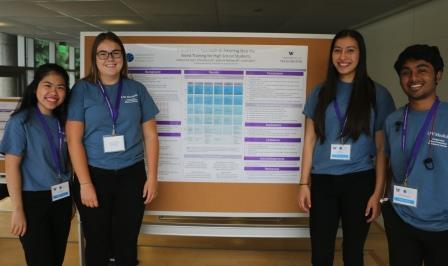
During the INSIGHT program, undergraduate, graduate, and medical students spend eight weeks completing a mentored research project, while high school students spend four weeks learning about public health and completing a group capstone research project. Throughout the program, all students participate in seminars and workshops on academic and research skills, seminars on current injury research, and tours and hands-on experiences at medical facilities around Seattle.
At the symposium, HIPRC also expressed gratitude to the four judges who evaluated the posters: Kenneth Jaffe, M.D., Brian Johnston, M.D., MPH, Sheila Lukehart, Ph.D., and Anneliese Schleyer, M.D., MHA.
Mentors for the INSIGHT projects included Elina Quiroga, M.D., MPH, Elizabeth Rosenman, M.D., Tam Pham, M.D., Rebecca Dale, DO, Judith Hagedorn, M.D., MHS, Lynn Stansbury, M.D., MPH, MFA, FACP, Janessa Graves, Ph.D., MPH, Megan Moore, Ph.D., MSW, Molly Fuentes, M.D., M.S., Monica Vavilala, M.D., Thomas Rea, M.D., MPH, Fred Rivara, M.D., MPH, Avanti Adhia, Sc.D., Dustin Long, M.D., Mary Fan, J.D., MPhil, Christopher DeCou, Ph.D., Vivian Lyons, Ph.Dc, MPH, Yewlin Chee, M.D., Elenore Bhatraju, M.D., MPH, Judith Tsui, M.D., MPH, and William Lack, M.D.
INSIGHT is directed by Monica Vavilala, M.D., and co-directed by Megan Moore, Ph.D., MSW. The high school program was led by Kelsey Conrick, MPH. The INSIGHT Research Program is funded in part by the National Institute of Child Health and Human Development (NICHD), as well as support from UW Medicine, Harborview Medical Center, HIPRC, Seattle Children’s Hospital, Amherst College and PEMCO Insurance.
